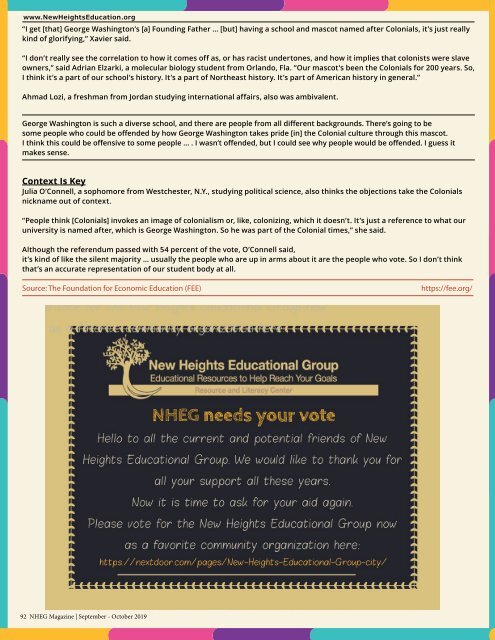NHEG-Magazine-September-October
You also want an ePaper? Increase the reach of your titles
YUMPU automatically turns print PDFs into web optimized ePapers that Google loves.
www.NewHeightsEducation.org<br />
“I get [that] George Washington’s [a] Founding Father … [but] having a school and mascot named after Colonials, it’s just really<br />
kind of glorifying,” Xavier said.<br />
“I don’t really see the correlation to how it comes off as, or has racist undertones, and how it implies that colonists were slave<br />
owners,” said Adrian Elzarki, a molecular biology student from Orlando, Fla. “Our mascot’s been the Colonials for 200 years. So,<br />
I think it’s a part of our school’s history. It’s a part of Northeast history. It’s part of American history in general.”<br />
Ahmad Lozi, a freshman from Jordan studying international affairs, also was ambivalent.<br />
George Washington is such a diverse school, and there are people from all different backgrounds. There’s going to be<br />
some people who could be offended by how George Washington takes pride [in] the Colonial culture through this mascot.<br />
I think this could be offensive to some people … . I wasn’t offended, but I could see why people would be offended. I guess it<br />
makes sense.<br />
Context Is Key<br />
Julia O’Connell, a sophomore from Westchester, N.Y., studying political science, also thinks the objections take the Colonials<br />
nickname out of context.<br />
The ADHD<br />
Overdiagnosis<br />
Epidemic Is a<br />
Schooling Problem,<br />
Not a Child One<br />
Today, children are being diagnosed with,<br />
and often medicated for, ADHD at an astonishing<br />
rate.<br />
www.NewHeightsEducation.org<br />
“People think [Colonials] invokes an image of colonialism or, like, colonizing, which it doesn’t. It’s just a reference to what our<br />
university is named after, which is George Washington. So he was part of the Colonial times,” she said.<br />
Although the referendum passed with 54 percent of the vote, O’Connell said,<br />
it’s kind of like the silent majority … usually the people who are up in arms about it are the people who vote. So I don’t think<br />
that’s an accurate representation of our student body at all.<br />
Source: The Foundation for Economic Education (FEE)<br />
https://fee.org/<br />
By Kerry McDonald<br />
Thursday, April 25, 2019<br />
Childhood exuberance is now a liability. Behaviors that were once accepted as normal, even if mildly irritating to adults, are<br />
increasingly viewed as unacceptable and cause for medical intervention. High energy, lack of impulse control, inability to sit<br />
still and listen, lack of organizational skills, fidgeting, talking incessantly—these typical childhood qualities were widely tolerated<br />
until relatively recently. Today, children with these characteristics are being diagnosed with, and often medicated for,<br />
Attention-Deficit/Hyperactivity Disorder (ADHD) at an astonishing rate.<br />
The ADHD Medical Dragnet<br />
While ADHD may be a real and debilitating ailment for some, the startling upsurge in school-age children being labeled with<br />
and medicated for this disorder suggests that something else could be to blame. More research points to schooling, particularly<br />
early schooling, as a primary culprit in the ADHD diagnosis epidemic.<br />
Over the last several decades, young people are spending more time in school and school-like activities than ever before. They<br />
are playing less and expected to do more at very young ages. When many of us were kids, kindergarten was mellow, playful,<br />
and short with few academic expectations.<br />
Now, 80 percent of teachers expect children to learn to read in kindergarten. It’s not the teachers’ fault. They are responding<br />
to national curriculum frameworks and standardized testing requirements that over the past two decades have made schooling<br />
more oppressive—particularly for young children.<br />
The youngest children are the ones most often caught in the ADHD medical dragnet. Last fall, Harvard researchers found that<br />
early school enrollment was linked to significantly higher rates of ADHD diagnosis. In states with a <strong>September</strong> 1 school enrollment<br />
age cutoff, children who entered school after just turning five in August were 30 percent more likely to be diagnosed<br />
with ADHD than children born in <strong>September</strong> who were about to turn six. Immaturity, not pathology, was the real factor.<br />
The ADHD Fallacy<br />
Marilyn Wedge, author of A Disease Called Childhood: Why ADHD Became An American Epidemic, sounds the alarm on ADHD<br />
overdiagnosis. In a Time <strong>Magazine</strong> article called “The ADHD Fallacy,” she writes:<br />
By nature, young children have a lot of energy. They are impulsive, physically active, have trouble sitting still, and don’t pay<br />
attention for very long. Their natural curiosity leads them to blurt out questions, oblivious in their excitement to interrupting<br />
others. Yet we expect five- and six-year-old children to sit still and pay attention in classrooms and contain their curiosity. If they<br />
don’t, we are quick to diagnose them with ADHD.<br />
92 92 <strong>NHEG</strong> | GENiUS <strong>Magazine</strong> MAGAZINE | <strong>September</strong> | www.geniusmag.com<br />
- <strong>October</strong> 2019<br />
According to the US Centers for Disease Control and Prevention (CDC), the percent of very young children (ages two to five)<br />
who were diagnosed with ADHD increased by over 50 percent between 2007/2008 and 2011/2012. As of 2016, data show that<br />
9.4 percent of all American children, or over six million kids, had been diagnosed with ADHD, and almost two-thirds of current<br />
ADHD-diagnosed children were taking medication for it. A March 2019 report on ADHD by Blue Cross and Blue Shield found<br />
that among commercially insured children of all ages, ADHD diagnosis rates increased 30 percent in just eight years.<br />
<strong>September</strong> - <strong>October</strong> 2019 | <strong>NHEG</strong> <strong>Magazine</strong> 93


















